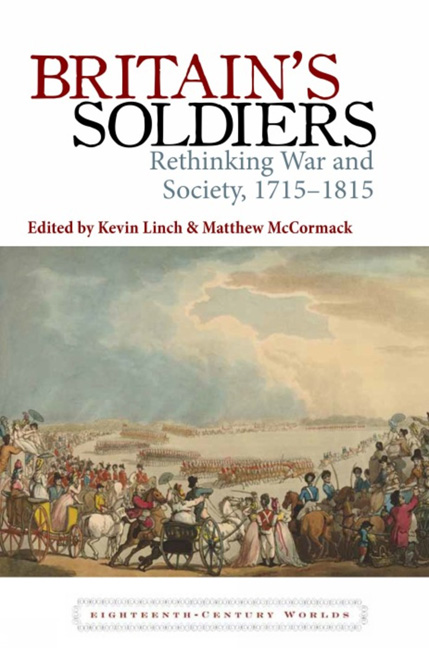Book contents
- Frontmatter
- Contents
- List of tables and figures
- Acknowledgements
- Notes on the contributors
- Introduction
- Part 1 Nationhood
- Part 2 Hierarchy
- 3 Effectiveness and the British Officer Corps, 1793–1815
- 4 Stamford Standoff: Honour, Status and Rivalry in the Georgian Military
- Part 3 Discipline
- Part 4 Gender
- Part 5 Soldiers in Society
- Index
4 - Stamford Standoff: Honour, Status and Rivalry in the Georgian Military
from Part 2 - Hierarchy
- Frontmatter
- Contents
- List of tables and figures
- Acknowledgements
- Notes on the contributors
- Introduction
- Part 1 Nationhood
- Part 2 Hierarchy
- 3 Effectiveness and the British Officer Corps, 1793–1815
- 4 Stamford Standoff: Honour, Status and Rivalry in the Georgian Military
- Part 3 Discipline
- Part 4 Gender
- Part 5 Soldiers in Society
- Index
Summary
ANYONE who has studied military history will be familiar with soldiers’ acute sensitivity to questions of precedence and honour. Most military historians take this for granted, although there is a growing appreciation that this type of phenomenon in the military is worthy of study, since institutional cultures can have a crucial operational significance. Armies are hierarchical organisations wherein formal rank is only achieved at great personal cost – be it by purchase, qualification or service – and where individual reputations are hard won and easily lost. These organisations have usually been all-male, and questions of status in the military have commonly been articulated in terms of masculine honour, creating further potential for rivalry and offence. Christopher Duffy has noted that the officers of European armies in the eighteenth century were particularly ‘rancorous and touchy’. In the Georgian military, disputes between officers over apparently trivial matters routinely escalated into exchanges of insults, blows and challenges to duel. Recourse was made with surprising frequency to the formal military authorities to resolve disputes, whether by courts martial or via the personal intervention of senior officers, the Secretary at War or even the king himself.
Nowhere was this truer than in England's militia. Reformed in 1757 as a parallel establishment to the regular army, it was officered by civilians who qualified by virtue of their social rank and landed property, and who thus provided ‘natural’ leaders to the civilian men who were balloted to serve in the county regiments. This equation of social with military rank may have simplified relations between militia officers – ‘Sir John or Sir Thomas must not be commanded by Squire any thing ’ – but there was potential for tension when militia and regular officers came into contact with each another. Militia officers were at once aware of their social superiority to their regular counterparts, and were sensitive to accusations of military inferiority. As a correspondent to the Gentleman's Magazine complained: ‘The present method taken for chusing the officers, and ascertaining their rank, has no regard to the necessary qualifications or abilities of the person to be commissioned.’ In general, the militia was from the outset vulnerable to comparison with the regulars.
- Type
- Chapter
- Information
- Britain's SoldiersRethinking War and Society, 1715–1815, pp. 77 - 92Publisher: Liverpool University PressPrint publication year: 2014



